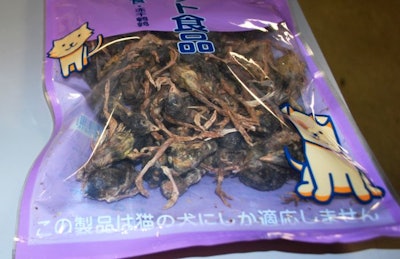
U.S. Customs and Border Protection (CBP) agriculture specialists recently seized a package of tiny dead birds in a passenger’s baggage at Washington Dulles International Airport.
The traveler arrived on a flight from Beijing, China, on January 27 and was destined to an address in Prince George’s County, Maryland. During a baggage examination, CBP agriculture specialists discovered a package with pictures of a cat and dog that the passenger said was cat food. The package contained a bunch of unknown small birds, about 2.5 to 3.5 inches in length.
The birds from China are prohibited for import due to the potential threat of highly pathogenic avian influenza. The avian products were seized on behalf of U.S. Department of Agriculture (USDA) and destroyed by incineration, with USDA approval.
“These dead birds are prohibited from importation to the United States as unprocessed birds pose a potentially significant disease threat to our nation’s poultry industries and more alarmingly to our citizens as potential vectors of avian influenza,” said Casey Durst, Director of Field Operations for CBP’s Baltimore Field Office. “Customs and Border Protection agriculture specialists continue to exercise extraordinary vigilance every day in their fight to protect our nation’s agricultural and economic prosperity from invasive pests and animal diseases.”
The U.S. Fish and Wildlife Service (USFWS), USDA’s Animal and Plant Health Inspection Service (USDA-APHIS) and the Centers for Disease Control and Prevention (CDC) regulate the importation of animals and animal products into the United States. Consignees and importers should consult their websites to ensure they comply with licensing, certification, and importation requirements.
CBP agriculture specialists perform a critical border security role in safeguarding America’s agricultural and natural resources from harmful pests and plant diseases. They have extensive training and experience in the biological sciences and agricultural inspection, inspect tens of thousands of international air passengers, and air and sea cargoes nationally being imported to the United States.
During a typical day last year, CBP agriculture specialists across the nation seized 4,695 prohibited plant, meat, animal byproduct, and soil, and intercepted 314 insect pests at U.S. ports of entry.















